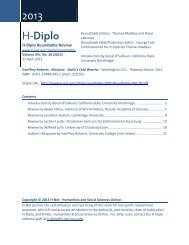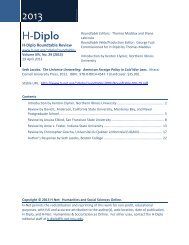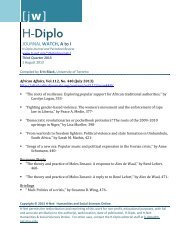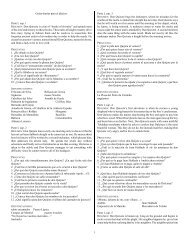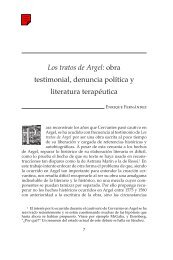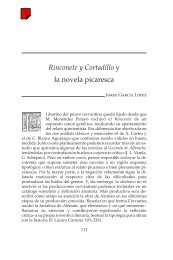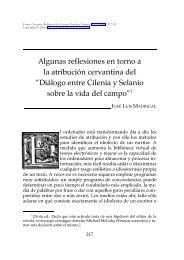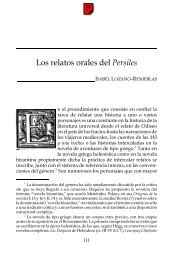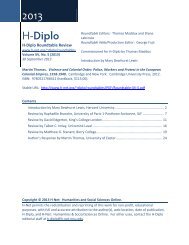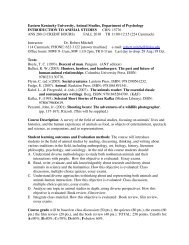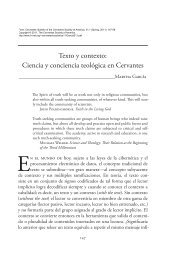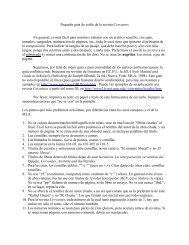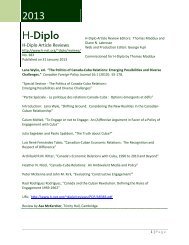The Function of Skepticism in Part I of Don Quijote - H-Net
The Function of Skepticism in Part I of Don Quijote - H-Net
The Function of Skepticism in Part I of Don Quijote - H-Net
Create successful ePaper yourself
Turn your PDF publications into a flip-book with our unique Google optimized e-Paper software.
Volume 30.2 (2010) <strong>The</strong> <strong>Function</strong> <strong>of</strong> <strong>Skepticism</strong><br />
123<br />
9): “we are as dwarfs perched upon the shoulders <strong>of</strong> giants” (9), and then<br />
she expla<strong>in</strong>s:<br />
This is neither a wholesale advocacy <strong>of</strong> reverence for the ancient<br />
author nor a wholesale dismissal <strong>of</strong> the contemporary author. It attempts<br />
to acknowledge the value <strong>of</strong> the ancients and the reliance <strong>of</strong><br />
the moderns upon them, and simultaneously to recognize the value<br />
<strong>of</strong> the moderns and the contributions their greater vision may make.<br />
<strong>The</strong> remark grants the importance <strong>of</strong> study<strong>in</strong>g the ancients, but not<br />
at the cost <strong>of</strong> ignor<strong>in</strong>g the achievements possible by the moderns. (11)<br />
<strong>The</strong>refore, when we consider what the critics have said as exemplified<br />
by Frederick de Armas, Carolyn A. Nadeau and Michael McGaha, and<br />
when we add to their views the general attitude towards imitation as expla<strong>in</strong>ed<br />
by García Galiano and Jackel<strong>in</strong>e T. Miller, it becomes clear that<br />
Cervantes did not reject authority <strong>in</strong> <strong>Part</strong> I when it comes to imitation/<br />
improvement. 11<br />
However, the theory <strong>of</strong> imitation is not the only concern with authority<br />
dur<strong>in</strong>g the Golden Age and the Renaissance: equally important<br />
is the role <strong>of</strong> authority <strong>in</strong> arguments that purport to establish truth. 12 For<br />
example, the rejection <strong>of</strong> authority is at the heart <strong>of</strong> the newly discovered<br />
and very <strong>in</strong>fluential skeptical texts <strong>of</strong> Sextus Empiricus. It is also a constant<br />
theme <strong>in</strong> all the writers <strong>of</strong> the Renaissance and the Golden Age that<br />
exhibit skeptical tendencies, such as for example Montaigne, Erasmus,<br />
Vives and Francisco Sánchez. 13 <strong>The</strong> rejection <strong>of</strong> authority <strong>in</strong> favor <strong>of</strong> di-<br />
11 As further support, <strong>Part</strong> I <strong>of</strong>fers explicitly a theory <strong>of</strong> the value <strong>of</strong> literature that depends<br />
at least <strong>in</strong> part on imitat<strong>in</strong>g authority. <strong>The</strong> discussion between the priest and the canónigo po<strong>in</strong>ts<br />
to the notion that art is worthy when it is imitative to some extent and <strong>in</strong> some way: “son más<br />
dignos de reprehensión los que hasta aquí han compuesto semejantes libros s<strong>in</strong> tener advertencia<br />
a n<strong>in</strong>gún buen discurso, ni al arte y reglas por donde pudieran guiarse y hacerse famosos, como lo<br />
son en verso y prosa los dos príncipes de la poesía griega y lat<strong>in</strong>a” (48, 505).<br />
12 For the sake <strong>of</strong> accuracy it should be noted that the explanation <strong>in</strong> the ma<strong>in</strong> body does<br />
not entail that the critics ignore the relation between truth and authority. My claim is weaker:<br />
the general emphasis and ma<strong>in</strong> concern tends to be the relation between imitation/improvement<br />
and authority.<br />
13 For more <strong>in</strong>formation about the skeptical tendencies <strong>of</strong> the mentioned authors, see for<br />
example Maureen Ihrie (1982, 11-18).



